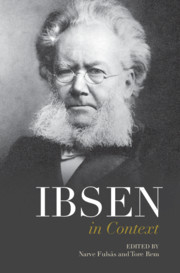Book contents
- Ibsen in Context
- Ibsen in Context
- Copyright page
- Contents
- Figures
- Contributors
- Preface
- Notes on the text
- Chronology
- Part I Life and Career
- Part II Culture and Society
- Part III Scandinavian Reception
- Part IV Internationalization
- Part V Afterlives
- Chapter 24 Biographies
- Chapter 25 Academic Responses
- Chapter 26 American Ibsens
- Chapter 27 Japanese Ibsens
- Chapter 28 Chinese Ibsens
- Chapter 29 Indian Ibsens
- Chapter 30 Mass Media and Popular Reception
- Further Reading
- Index
Chapter 29 - Indian Ibsens
from Part V - Afterlives
Published online by Cambridge University Press: 23 April 2021
- Ibsen in Context
- Ibsen in Context
- Copyright page
- Contents
- Figures
- Contributors
- Preface
- Notes on the text
- Chronology
- Part I Life and Career
- Part II Culture and Society
- Part III Scandinavian Reception
- Part IV Internationalization
- Part V Afterlives
- Chapter 24 Biographies
- Chapter 25 Academic Responses
- Chapter 26 American Ibsens
- Chapter 27 Japanese Ibsens
- Chapter 28 Chinese Ibsens
- Chapter 29 Indian Ibsens
- Chapter 30 Mass Media and Popular Reception
- Further Reading
- Index
Summary
‘Indian Ibsens’ demonstrates how Ibsen’s oeuvre inflected the Indian stage as it moved from its traditional corpus of mythological, historical and musical drama to a theatre of social realism and revolutionary individualism that challenged the entrenched orthodoxies of an ancient civilization. Tracing the evolution of the reception of Ibsen separately for southern, western and eastern Indian theatre from the 1920s onwards, this chapter reveals some significant trajectories: first, that the dominance of the realistic plays of Ibsen’s middle period gave way from the 1970s to interest in the complex symbolism of his later work; and secondly, that the adaptations move through three distinct phases: translation (with Indian names and locales), transculturation in terms of local imperatives, and finally, radical transcreation where Ibsen is transported to the tropics by way of indigenous performance protocols of dance, music, mime and myth. In addition, the chapter briefly chronicles Ibsen’s impact on Indian fiction and film, in the Indian university system through literature and gender studies courses, and among Indian NGOs vying for the prestigious Ibsen Award using an Ibsen play for grassroots social empowerment. India is presented as the repository of one on the richest Ibsen archives available today.
Information
- Type
- Chapter
- Information
- Ibsen in Context , pp. 256 - 263Publisher: Cambridge University PressPrint publication year: 2021
